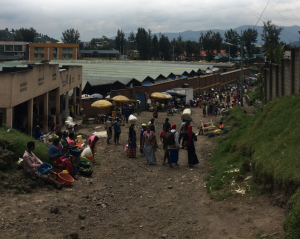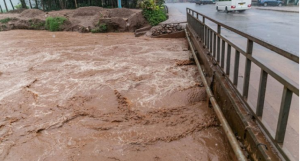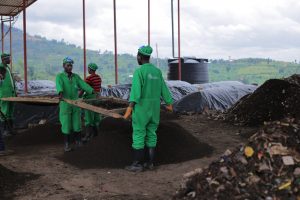In many parts of the world, the coronavirus pandemic has laid bare the fragility of our economies as well as irrefutable truths about the inequalities of unsustainable systems. However, it has also revealed the potential for societies to leverage innovation and technology to improve livelihoods while minimizing anthropogenic causes of environmental degradation. For example, investments in ICT has enabled office workers to maximize the use of digital platforms and teleconferencing to work remotely. Once the immediate public health challenge of the coronavirus pandemic subsides, similar investments are needed to leapfrog antiquated, carbon-intensive lifestyles and enable green growth strategies to realize their full potential.
The post-pandemic coronavirus response should be viewed as an opportunity to drive investments and deliver green growth initiatives to city residents with significant co-benefits including long-term impact on public health, air quality, and environmental restoration. It’s not enough to build for greater growth. Post-pandemic investments should target opportunities that take into full consideration the long-term health of communities as well as social inclusion.
Sustainable and Equitable Access to Services
Despite the advancements and innovation in the public health sector, experts still recommend hand washing as the best preventative measure to combat the disease. The installment of hand washing facilities has been a core element of Rwanda’s preventative measures to curbing the spread of new coronavirus infections. However, access to water remains inequitable in distribution with limited adequate hand washing facilities in poor communities. A recent rapid assessment of market facilities in Musanze conducted by GGGI in collaboration with the Rwanda Women’s Network (RWN) highlighted the need for improved WASH (Water, sanitation and hygiene) facilities in peri-urban areas. According to a UNICEF/WHO 2019 on Progress on Household Drinking Water, Sanitation and Hygiene (2000-2017) report, 86% of the population has no handwashing facility at home.

Figure 1 Kariyere market
Innovation is needed to ensure adequate and equitable access to water in the post-pandemic response. These include the integration of innovative finance mechanisms and expansion of public private partnerships to secondary cities, rural, and peri-urban communities to increase water availability. In addition, water reuse, recycling, and rainwater harvesting should be exploited to leverage Rwanda’s precipitation patterns. For example, researchers estimate that in 2016, the retention of 30% of stormwater run-off during the rainy season would have met irrigation requirements during the subsequent dry season. A similar concept could be used to target areas with limited water access and WASH facilities. Rethinking is needed to address how flood water can be managed, provisioned to areas of greatest need, and repurposed for the maximum benefit of communities through sound natural resource management and incorporation of green growth principles.
In response to these challenges, GGGI Rwanda has embedded private sector engagement in the current Green Climate Fund (GCF) supported $1.8M project on National Adaptation Readiness and preparatory support for building flood resilience capacities in Rwanda. The project aims to envelop circular economy approaches to rainwater use and reuse to address stormwater water run-off in flood-prone areas. In addition, GGGI has provided technical assistance for drafting the Rwanda Green Building Minimum Compliance System (GBMCS), which also incorporates rainwater harvesting for improved water resources management. Capacity building activities have commenced for the GBMCS, however additional funding is needed to enable the retrofitting of existing building stocks to improve water use efficiency.
In the post-pandemic response, investments should be targeted to address the needs of communities while leveraging Rwanda’s access to natural resources. The challenge of recurrent flooding also presents an opportunity to simultaneously address water shortages and water access through innovative approaches that are possible through circular economy-based, long-term planning and investments. Innovative finance solutions such as municipal green bonds should also be considered to pave the way for investment and private sector mobilization in the provisioning of repurposed stormwater and harvested rainwater to achieve greater access and availability to water resources for poor communities.

Figure 2 Kigali city during rainy season
Air Quality
Perhaps one of the most dramatic effects of the coronavirus lockdown has been the marked improvement in air quality around the world. Kigali alone has seen a 20% reduction in air pollution since the start of the stay at home order. Air pollution has several well-documented long-term public health implications. In addition, recent studies also suggest that exposure to air pollution increases susceptibility to the virus. While Rwanda’s motorcycle taxi cooperatives have filled gaps in access to transport and low-cost mobility, this has come at a price in terms of increased road congestion, air pollution, as well as the potential or transmitting pathogens through the shared use of helmets.
In response, cities must make significant investments in infrastructure for electric public transportation as well as non-motorized transport. GGGI has recently completed a rapid assessment of e-bus charging infrastructure in the City of Kigali to estimate demands on the grid to enable the realization of electric bus infrastructure to meet the needs of Kigali’s residents. Furthermore, efforts to track, monitor, and regulate emissions from motorcycles should be implemented in the post-pandemic response to ensure that cities do not regress into business-as-usual patterns of air pollution production. GGGI has initiated a 4-year project on walking and cycling infrastructure with UN Environment to promote further investment in walkways and cycle lanes in urban centers. The aim of which is to increase access to multiple, low-carbon modes of transport across income levels.
Blended finance is needed to mobilize private capital flows to address key infrastructure gaps needed to make e-mobility a realistic option for public transport. In addition, innovative finance mechanisms will allow for continued investment in infrastructure for non-motorized transport (walking and cycling). While non-motorized transport (NMT) is often overlooked for infrastructure that caters to single occupancy vehicles, cities that lack NMT have come to a standstill when other modes of transport suddenly become unavailable. With over half of residents of Kigali’s unplanned settlements walk to work, continued investment in NMT also has significant implications for increasing social inclusion and access to sustainable services for city residents.
Invest in Sustainable Waste Management
Post-pandemic investments should also target integrated waste management to better serve cities. Currently, an estimated 86% of waste generated in Kigali is composed of organic matter with very little being diverted to composting. Similarly in secondary cities, organic waste comprises 64% in Muhanga and 75% in Huye. The pandemic has also highlighted the need for investment into the treatment of specialized waste streams such as medical waste. Additional capacity is needed to facilitate collection as well as to ensure the safety and protection of waste collectors to limit the transmission of COVID-19.
Collection at source and waste treatment centers have the potential to convert waste into valuable resources through circular economy approaches. Biogas digesters are already in use in green villages and in institutions such as prisons, saving the cost of fuel and avoiding air pollution and deforestation caused by the burning firewood and charcoal. As waste streams diversify, the post-pandemic response will need to include the separation at source and modernization of specialized waste treatment centers. The incorporation of processing facilities for both inorganic and organic waste would enable the production of bioplastic, pavers from recycled plastic, and potentially material for fuel that can be used for heavy industry purposes such as cement and steel production. The waste management system has not kept up with the pace of development of Kigali and the secondary cities. The post-pandemic response is an opportunity to fully modernize the system that has thus far lagged behind the needs of residents. Concessional financing should be leveraged to support emerging private sector initiatives that are able to valorize Rwanda’s increasingly diverse waste streams.

Figure 3 Organic Waste composting at Landfill site in Huye
The coronavirus lockdown has highlighted significant, unsustainable inadequacies impeding low-carbon growth and development. At the same time, the coronavirus outbreak is an opportunity to drive investments and deliver green growth initiatives to city residents with significant long-term impact on public health, air quality, and environmental restoration. The IMF is projecting Rwandan GDP growth to fall to 5.1% as a result of coronavirus from an earlier estimate of 9.4%. In order to avoid locking in carbon-intensive patterns of mobility, consumption, and waste management, green growth solutions should be integrated into the post-pandemic response, in order to continue to reduce emissions while enabling economic growth.
Author: Michelle DeFreese, Senior Green Growth Officer , GGGI Rwanda